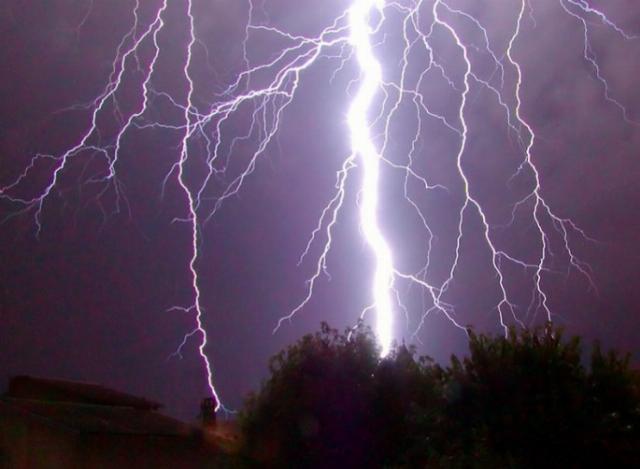The real cause of weather-related deaths
Despite fear-mongering about climate change supercharging natural disasters, weather-related deaths have declined dramatically.
According to the Emergency Event Database, the total global deaths per decade from climate-related disasters has fallen by more than 96% since the 1920s. Data show that between 1960 and 2020, there was an unprecedented decrease in climate-related deaths compared to the period between 1920 and 1959.
This decline is even more impressive considering that the global population has more than quadrupled during this period, from about 2 billion in 1920 to nearly 8 billion by 2020.
The dramatic reduction in fatalities is not just a statistic; it represents a fundamental improvement in the ability of our species to adapt and withstand the forces of nature. It’s a story of triumph over adversity and of innovation in the face of danger.
Why Deaths Have Dropped
For millennia, the whims of weather patterns dictated the rise and fall of civilizations, determined the success of harvests, and all too often claimed countless lives. However, the 20th century marked a pivotal turning point in this age-old struggle.
One of the most significant factors in reducing deaths has been the dramatic strengthening of infrastructure, particularly in developing countries. The World Meteorological Organization’s “State of the Global Climate 2023” noted that improved early warning systems and disaster management have continued to reduce loss of life from extreme weather events.
Bangladesh, once notorious for cyclone-related deaths, has seen a dramatic reduction in casualties. In 1970, Cyclone Bhola killed an estimated 300,000–500,000 people. In contrast, Cyclone Amphan in 2020, though causing significant damage, resulted in fewer than 100 deaths in Bangladesh, thanks largely to early alerts and evacuation procedures.
The Netherlands, where much of the land lies below sea level, has been a pioneer in flood control. Its system of dikes, dams, and storm surge barriers, including the famous Maeslant structure near Rotterdam, has effectively protected the country from catastrophic flooding.
In the United States, the Mississippi River and Tributaries Project, initiated after the Great Mississippi Flood of 1927, has prevented billions of dollars in flood damages. Similar projects around the world, from China’s Three Gorges Dam to London’s Thames Barrier, have saved countless lives.
In hurricane-prone areas, buildings are now designed to withstand high winds and flying debris. The implementation of strict building codes in Florida after Hurricane Andrew in 1992 significantly reduced structural damage during subsequent storms.
Similarly, earthquake-resistant construction techniques have saved numerous lives in seismically active regions. Japan’s stringent building codes, which require structures to withstand severe earthquakes, have dramatically reduced fatalities from seismic events.
Drought used to be one the of the deadliest climatic events, even ending the reign of famous empires. Today, advances in agricultural technology and practices have significantly reduced deaths from drought-induced famines. For instance, the development of drought-tolerant maize has benefited millions of farmers in Africa.
Misreporting Causes of Damage Fans Fear
However, despite the unprecedented decrease in fatalities from natural calamities, some argue that the economic costs of natural disasters have risen. It is true that monetary losses have increased, but this is partly due to a lack of planning that exposes increasingly valuable property to the risks of storm floods and winds.
A classic example of this is the Indian city of Chennai (formerly Madras), where floods have become a regular occurrence because of the dismal state of infrastructure. The city’s newest construction zones are in areas where water naturally accumulates, putting inhabitants at risk during heavy rains. Living in the same city a while back, I found myself wading surreally in knee-deep water to reclaim my luggage from a car park where the flood rose to my hips.
A simple analysis revealed that Chennai’s heavy rains have occurred multiple times over many decades. Repeated flooding in this city, and others, is primarily from mismanagement, not climate change.
Where applied, human ingenuity has been spectacularly successful in countering nature’s threats. Humankind’s shortcoming in this story is its failure to apply appropriately its know-how rather than neglecting to control an uncontrollable climate.
Vijay Jayaraj is a Science and Research Associate at the CO2 Coalition, Arlington, Virginia. He holds an M.S. in environmental sciences from the University of East Anglia and a postgraduate degree in energy management from Robert Gordon University, both in the U.K., and a bachelor’s in engineering from Anna University, India.

FOLLOW US ON
Recent Articles
- Deep State Anatomy and Physiology
- Sisterhood of the Traveling Pronouns
- Trump’s Tariffs: A Chance to Bring Back Lost Jobs
- Trump's Six-Point Plan for Making America Great Again
- Make IRS Sauce The Same For Both Citizen Goose and Politician Gander
- 'Battle at the Border' Documentary is an Insightful Look at Immigration
- The NYT Prefers its Own Conspiracy Theories
- Would the FDA Pass Its Own Audit?
- War By Other Means: Demographics
- The Trump Administration’s Support for the Israel-Azerbaijan Strategic Partnership Can Benefit America
Blog Posts
- Will Colorado pass what’s essentially a ‘trans blasphemy’ bill?
- Elie Mystal thinks every law before 1965 should be labeled ‘unconstitutional’ and defunct
- The gift that keeps on giving
- Wasting time is hard to do – leftists still manage it
- Give Trump a chance
- Nina 'Scary Poppins' Jankowicz's ex-NGO partner makes clear 'bankrupting Tesla' is his most important accomplishment
- America’s federal court judges: a self-anointed priesthood.
- Yvette Clarke: Don’t fire the bureaucrats, they’re the efficiency experts!
- Big Balls to the rescue: DOGE saves a terabyte of data destroyed by USIP employees
- As Trump’s EPA tries to recover ‘green’ slush fund dollars, Native communities face energy blackouts
- In Britain, ‘transphobic toddlers’ are the new menace
- One outrage after another: Europe is lost
- Judicial misconduct allegations shake legal system
- Look at all the benefits of socialism!
- French right-wing leader Le Pen banned from running for office






